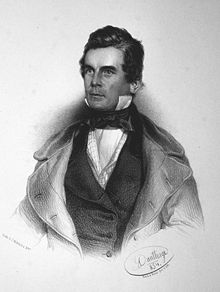Josef Redtenbacher (chemist)

Josef Redtenbacher (born March 12, 1810 in Kirchdorf an der Krems , Upper Austria; † March 5, 1870 in Vienna ) was an Austrian chemist .
Life
He graduated from the Stiftsgymnasium Kremsmünster and then studied medicine at the University of Vienna and from 1834 he was Joseph Franz von Jacquin's chemistry assistant at the chemistry and botany department there. Before that he had mainly devoted himself to botanical subjects, but was also an enthusiastic student of the mineralogist Friedrich Mohs . In 1840/41 he went on a research and study trip that took him to various German and French laboratories, above all to Justus von Liebig in Giessen . In his absence he was appointed professor of chemistry at the University of Prague . After his return, he used the insights he had gained abroad to bring the chemistry lessons there up to date.
In the course of the great university reform in the Habsburg Monarchy in 1848/49, Redtenbacher was appointed to the chair for general and pharmaceutical chemistry at the University of Vienna. In addition, many of his former Prague students (e.g. Friedrich Rochleder , Johann Gottlieb , Franz Pless , Heinrich Hlasiwetz , Theodor Wertheim ) were appointed to other Austrian universities and colleges and were thus able to modernize chemistry classes in almost the entire Habsburg monarchy. Redtenbacher can therefore be regarded as the most important pioneer of modern chemistry in Austria.
Redtenbacher worked as a chemistry professor at the University of Vienna from 1849 until his death. However, he had a much less well-equipped laboratory at his disposal than in Prague and the spatial situation, based on the number of students, was probably a lot worse in Vienna. This, together with the numerous duties as a reviewer for the ministry and other institutions, may be the reason why Redtenbacher's research performance declined sharply when he moved to Vienna. However, he also produced many important students here. Shortly before his death, he planned the new university laboratory together with Heinrich von Ferstel , but Redtenbacher did not live to see it being completed. He died on March 5, 1870 in Vienna.
Redtenbacher's scientific achievements fall mainly into his time in Giessen and Prague. In his first important study, he tried, together with Justus von Liebig , to determine the atomic weight of carbon . Other important achievements were the discovery of acrolein , the acrylic acid and the fermentation of glycerol by yeast . He also did research on taurine .
In 1847 he became a full member of the Austrian Academy of Sciences , and the Bavarian Academy of Sciences appointed him a corresponding member in 1854. In 1860 he was elected a member of the Leopoldina .
His brother was the entomologist and doctor Ludwig Redtenbacher .
literature
- Constantin von Wurzbach : Redtenbacher, Joseph . In: Biographisches Lexikon des Kaiserthums Oesterreich . 25th part. Imperial and Royal Court and State Printing Office, Vienna 1873, pp. 116–121 ( digitized version ).
- Albert Ladenburg : Redtenbacher, Joseph . In: Allgemeine Deutsche Biographie (ADB). Volume 27, Duncker & Humblot, Leipzig 1888, p. 542 f.
- W. Oberhummer: Redtenbacher Josef. In: Austrian Biographical Lexicon 1815–1950 (ÖBL). Volume 9, Verlag der Österreichischen Akademie der Wissenschaften, Vienna 1988, ISBN 3-7001-1483-4 , p. 13 f. (Direct links on p. 13 , p. 14 ).
- Johannes Uray, Organic Chemistry in Chemical Research and Teaching at Austrian Universities between 1840 and 1870. In: Report on the 25th Austrian Historians' Day in St. Pölten 2008. St. Pölten 2010, pp. 402–427.
Web links
- Entry on Josef Redtenbacher (chemist) in the Austria Forum (in the AEIOU Austria Lexicon )
Individual evidence
- ^ W. Oberhummer: Redtenbacher Josef. In: Austrian Biographical Lexicon 1815–1950 (ÖBL). Volume 9, Verlag der Österreichischen Akademie der Wissenschaften, Vienna 1988, ISBN 3-7001-1483-4 , p. 13 f. (Direct links on p. 13 , p. 14 ).
- ↑ Member entry by Prof. Dr. Joseph Redtenbache (with picture) at the Bavarian Academy of Sciences , accessed on February 6, 2016.
- ↑ Member entry by Josef Redtenbacher at the German Academy of Natural Scientists Leopoldina , accessed on February 6, 2016.
| personal data | |
|---|---|
| SURNAME | Redtenbacher, Josef |
| ALTERNATIVE NAMES | Redtenbacher, Joseph |
| BRIEF DESCRIPTION | Austrian chemist |
| DATE OF BIRTH | March 12, 1810 |
| PLACE OF BIRTH | Kirchdorf an der Krems |
| DATE OF DEATH | March 5, 1870 |
| Place of death | Vienna |